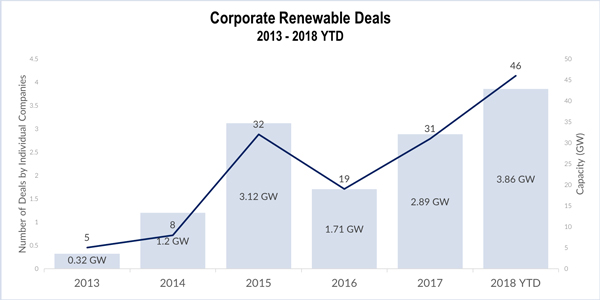By Rich Heidorn Jr.
Nonutility buyers have contracted for more than 3.5 GW of renewable energy thus far in 2018, breaking the annual record of 3.12 GW set in 2015, the Rocky Mountain Institute’s Business Renewables Center (BRC) reported.
The 46 deals so far this year also best the 31 deals totaling 2.89 GW in 2017.
In total, U.S. corporate purchases of renewables have totaled 13.52 GW since 2008, according to the BRC, which says its member companies have been responsible for most nonutility transactions for renewable energy in the country.
The center says almost 60 companies have participated to date, up from four companies in 2013.
Facebook, which was one of the original four, pushed 2018’s total to the record with its July 18 announcement that it will buy 437 MW of solar power from six projects for its Prineville, Ore., data centers.
Facebook is among 140 companies that pledged to transition to 100% renewables. Other large purchases this year came from AT&T, Walmart, Microsoft and Apple.
“We are bearing witness to unprecedented growth in this market, which is critical to achieving the goal of a clean, prosperous and secure low-carbon economy,” said Jon Creyts, managing director at RMI.
The BRC, which launched in 2015 with about two dozen members, now has 250.
It helps simplify renewable purchases, offering procurement templates, primers and a Market Analysis Platform to identify the most attractive regions for wind or solar projects. BRC’s Marketplace allows corporate buyers to search wind and solar power projects available for off-take and gives developers a way to market their projects and collect information from potential buyers.
BRC’s goal is to facilitate procurement of 60 GW of renewables by 2030.
In addition to providing a way to enhance their green credentials, corporations increasingly see renewables as cost-effective. For example, storage and information management company Iron Mountain signed a 15-year power purchase agreement for wind in 2016 that it says will save it up to $500,000 in power costs annually. (See Cost Trends Favor Renewables Despite Coming Policy Shifts.)
In 2015, corporations passed utilities as the top purchaser of wind power.
However, some corporate buyers have complained their efforts have been hamstrung by insufficient transmission to move Midwest wind. (See Is RTO Tx Planning Hampering Green Corporate Goals?)



